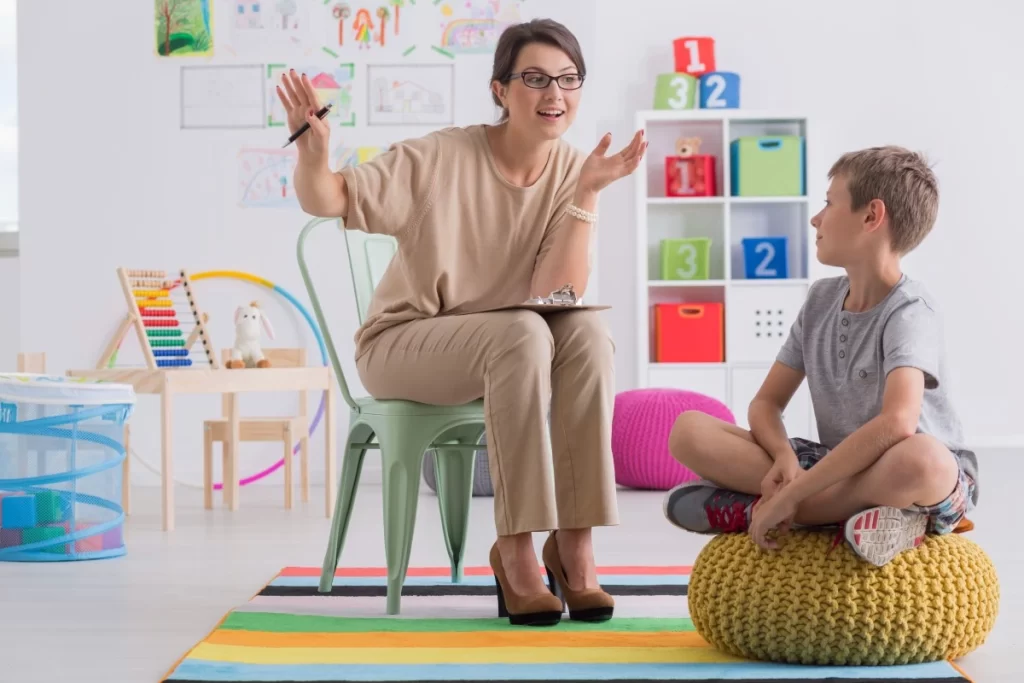Challenging Behaviour in Children
In UK guidance, “challenging behaviour” describes behaviours that put the child or others at risk, reduce quality of life, or significantly restrict participation in everyday activities. These behaviours often require functional assessment and the right care planning for the best possible emotional support and overall positive outcomes. It’s important to note that challenging behaviour is a form of communication and usually results from unmet needs, to avoid a poorer quality of life in children and young people.
When we try to understand the function of behaviour, we are able to see beyond the challenges. Common causes why challenging behaviour happens, include:
- Communication: behaviour may be a child’s way of asking for attention, avoiding demands, or expressing pain/hunger. It can directly affect communication and a person’s behaviour.
- Unmet sensory needs: noisy, crowded or overwhelming environments can trigger meltdown behaviours.
- Medical factors: pain, constipation, sleep problems, epilepsy, or medication side-effects.
- Mental health: anxiety, trauma, depression, or stress may underlie behaviour changes.
- Environmental & routine factors: inconsistent expectations, unpredictability, or chaotic settings.
- Learned responses: reinforcement (accidental rewards) can maintain behaviours.
Therefore, understanding function leads to proactive and appropriate support.
Who Does it Commonly Affect?
Challenging behaviour is seen across childhood, but is more common and often more complex when a young person experiences:
- a learning disability
- autism
- communication needs
- sensory processing differences
- neurodevelopmental conditions (e.g., ADHD)
Estimates in specialist literature (populations with learning disabilities) suggest roughly 5–15% may show behaviour that challenges at different age levels, though figures vary with setting and definition.
The Benefits of Proactive Approaches
Proactive approaches aim to anticipate needs, triggers or risks before they escalate. In children’s services, for example, healthcare professionals identify a sensory trigger or signs of distress and step in rather immediately than waiting for a meltdown or crisis. This can make a huge difference:
- Reduces incidents of harm or restraint
- Minimises disruption for the child and others
- Cuts down emergency call-outs or unplanned admissions
When staff or parents understand what a child needs and build support, children experience less stress and anxiety, have more consistent routines and expectations, and can participate more fully in school, play and family life.
Being proactive means working with the person, not just their behaviour.
It’s about planning ahead, teaching skills, and shaping environments so challenges don’t escalate, which benefits the child, their family, staff, and the wider system.
Positive Behaviour Support (PBS)
In NICE’s guidance on learning disability and behaviour that challenges, “proactive” measures like Positive Behaviour Support are linked to better long-term outcomes than reactive or punitive measures.
PBS is rooted in the concept that challenging behaviour often signals unmet needs. You naturally reduce the behaviour by improving a child’s daily life – better communication, more meaningful activities, and less stress. That way, children:
- feel safer and more included
- get more opportunities to play, learn and socialise
- develop confidence and skills instead of relying on behaviour to communicate
The foundation of PBS lies in gaining a comprehensive understanding of each individual, including their strengths, needs, and desires. It:
- Looks for the ”why” behind the behaviour
- Reduces the use of punishment and restraint
- Teaches positive alternatives and new skills
- Makes support consistent across settings
- Reduces stress for families and care teams
PBS shifts the focus from “managing behaviour” to “supporting the child” with their own emotions.
Once it identifies triggers, adapts environments, teaches new skills, and involves families, PBS helps children lead richer, safer lives with fewer incidents of challenging behaviour by responding directly to their needs.
Focusing on Prevention Rather than Reaction
Focusing on prevention rather than reaction is about creating the conditions for success before difficulties arise.
Instead of waiting until a behaviour escalates and then trying to stop it, the care teams around the child:
- anticipate triggers (noise, change of routine, demands, pain, tiredness)
- change the environment or task to reduce stressors
- teach and prompt alternative skills (asking for help, using a break card)
- plan ahead with agreed strategies so everyone responds the same way
This is the proactive part of Positive Behaviour Support.
Learn more about what Leaf Complex Care’s Restrictive Practice Lead, George Rickard, has to say on building better care for people who need support by using the least restrictive practices.

Examples of Proactive Approaches
Proactive approaches work best together. They are a part of a person-centred support plan that improves quality of life and reduces behaviours of challenges by acting early, not late. Visual support can help children understand expectations, and providing precise and straightforward instructions can positively affect outcomes.
Behaviour Support Plans
Behaviour support plans involve the person requiring support, family members, support workers, and therapy teams. These plans serve as a step-by-step guide for managing challenging behaviour, focusing on understanding the purpose behind each behaviour and meeting the person’s needs through compassion.
The process of developing a behaviour support plan involves several key steps. These include:
- Describing the challenging behaviour
- Identifying its underlying reasons
- Developing proactive strategies to promote happiness and calmness
- Recognising early warning signs
- Formulating appropriate responses
- Recording a reactive strategy to ensure safety
- Documenting post-reactive strategy to prevent further escalation
- Obtaining agreement from all key individuals in the person’s life
- Make sure the needs of the person are met
The plan’s success lies in its implementation, regular updates, and ongoing review to accommodate the person’s evolving needs.
Positive Reinforcement
Positive reinforcement means adding something helpful, pleasant, or rewarding after a desired behaviour so that the child is more likely to repeat that behaviour in future, even during big emotions. It’s a cornerstone of UK good practice in parenting, teaching and Positive Behaviour Support (PBS).
Child shows a desired behaviour → adult provides an immediate, meaningful reward → behaviour strengthens.
Choose rewards the child values: praise, stickers, special time, favourite activities, and tokens. As the behaviour becomes established, you can reduce tangible rewards and rely more on social praise or natural outcomes.
Environmental Modifications
Environmental modifications are about designing the world so the child can succeed. They remove triggers, add clarity, and make self-regulation possible, which is far more effective than trying to “manage” a crisis once it starts. This can include physical changes, sensory changes, predictability/routine changes, and staff behaviour.
💡 Why it works?
- Many children, especially autistic, those with a learning disability or sensory sensitivities, become distressed because the environment is overwhelming or unpredictable.
- By reducing stressors and making things clearer, you prevent escalation before it starts.
- NICE NG11 specifically says: “Address environmental factors that may contribute to behaviour that challenges, such as noise, overcrowding or lack of meaningful activity.”
Effective Communication Strategies
Many children (especially those with learning disabilities, autism or speech-language difficulties) struggle to express pain, frustration or choices. Without an effective channel, they may use behaviour (shouting, aggression, running away) to communicate. Giving them a reliable way to be understood dramatically reduces distress and challenging behaviour.
What is most important is to understand the child’s behaviour from the current communication, make your communication clear, use visual timetables, or picture schedules, ‘Now and Next’ boards to show the sequence of activities or photos and symbols for choices (“drink”, “toilet”, “play”). Then offer alternative communication systems (AAC) such as PECS (Picture Exchange Communication System) cards, sign language or Makaton, model and prompt replacement communication, use a consistent communication environment to build structured choices, teach emotional legacy and listen actively and validate.
Social Skills Training
Social skills training (SST) is a structured, evidence-based way of teaching and practising specific social behaviours that help a child interact more successfully with others. Rather than assuming children “pick up” social rules, SST explicitly breaks them down, teaches them step-by-step and gives repeated practice.
It’s widely used in UK schools, youth services, CAMHS, speech and language therapy and autism support.
Why does it matter for children with challenging behaviour?
- Many children who display challenging behaviour try to communicate or cope but lack the social tools to do so.
- Teaching those tools reduces frustration, improves peer relationships and lowers aggression, withdrawal or disruption incidents.
- NICE guidance on learning disabilities and autism recommends teaching alternative, functional skills as part of Positive Behaviour Support.
Self-Care and Stress Management
Self-care and stress management include many approaches designed to reduce stress, prevent its harmful effects, and enhance overall well-being for children.
In children, stress and unmet sensory or emotional needs can trigger or worsen challenging behaviour. Teaching children to recognise their own signs of stress and giving them tools to calm down is a core proactive skill. In parents and staff, high-stress situations, repeated incidents, and sleepless nights quickly lead to burnout. Calm and regulated adults can far better prevent escalation and model coping skills.
Stress management therapy can effectively lower stress levels, address its impact, uplift mood, and improve quality of life. There are various types of stress management therapies available. A good PBS plan often includes:
- Child’s personal calming strategies (visual card or step-by-step guide)
- Adults’ self-regulation reminders (“use low voice, give space, breathe”)
- Team agreements on breaks and support after incidents
This makes stress management a planned part of support, not an afterthought.
The Key to Successful Implementation of Proactive Approaches
Successful implementation of proactive approaches depends on understanding the child, planning collaboratively, maintaining consistency, and supporting children and adults to stay regulated.
Essentially, it’s prevention + preparation + collaboration + consistency + monitoring.
Proactive approaches consist of functional assessments (A-B-C logs), tailor strategies to the child’s strengths, preferences and needs, applying strategies consistently at home, school, and therapy, providing PBS, de-escalation, communication, and stress management training, implementing strategies before behaviour escalates, and involving speech and language therapists, occupational therapists, CAMHS, educational psychologists, and families.
Focus on understanding how behaviour puts pressure on everyone involved, planning, and supporting everyone involved to reduce behaviours of concern and improve quality of life.

Implementation of Proactive Approaches with Leaf Complex Care
At Leaf Complex Care, we are committed to implementing proactive approaches in our care services. We understand that each person has unique needs, and our approach is centred around providing humanised care that prioritises well-being and fosters positive outcomes.
Our proactive approaches are:
- Prevention-focused, addressing triggers before behaviour escalates.
- Autism-informed support
- Trauma-informed support
- Person-centred support
- Collaborative, involving families, staff, and multidisciplinary teams.
- Evidence-based
- Consistent, ensuring strategies work across home and community settings.
- Supportive, embedding self-care for the people we serve and our care teams.
LCC’s Case Studies: Vladan’s Care Journey: Life-Changing Outcomes Based on Person-Centric Practices
Leaf Complex Care has offices in multiple areas, including Bristol, South East, Somerset and the Midlands.
Make a referral to our therapy team today if you are seeking humanised support that focuses on proactive approaches and personalised support.

